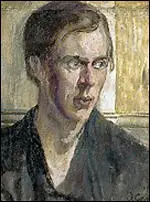Adrian Stephen

Adrian Stephen, the son of Leslie Stephen and Julia Princep Duckworth, was born at Hyde Park Gate, Kensington, in October 1883. His mother had three children from a previous marriage: George Duckworth (1868–1934), Stella Duckworth (1869–1897), and Gerald Duckworth (1870–1937). Adrian had a brother and two sisters: Vanessa Stephen (1879), Thoby Stephen (1880) and Virginia Stephen (1882).
Adrian was considered to be his mother's favourite and was especially hurt by her death on 5th May 1895. She died following an attack of influenza which had turned into rheumatic fever.
Adrian was educated at Westminster School and Trinity College. After the death of his father in 1904, his sisters, Vanessa Stephen and Virginia Stephen moved to Bloomsbury. Their brother, Thoby Stephen, introduced them to some of his friends that he had met at the University of Cambridge. The group began meeting to discuss literary and artistic issues. The friends and relatives, who eventually became known as the Bloomsbury Group, included Adrian, Duncan Grant, Clive Bell, John Maynard Keynes, E. M. Forster, Leonard Woolf, Lytton Strachey, David Garnett, Desmond MacCarthy and Arthur Waley.
The Stephen family went on holiday to Greece in September 1906. According to Hermione Lee, the author of Virginia Woolf (1996): "For Thoby, Greece was the last long holiday before he was called to the Bar. He was full of energy and ambitions, passionately opinionated and enthusiastic." Thoby Stephen, who returned home seriously ill from typhoid, died on 20th November 1906.
On 7th February 1907, his sister Vanessa Stephen, married Clive Bell. Adrian now moved in with his other sister, Virginia Stephen in Fitzroy Square. The arrangement came to an end when Virginia married Leonard Woolf in 1912.
Adrian Stephen had an affair with the artist, Duncan Grant, but in 1914 married Karin Costelloe, a philosophy graduate and expert on Henri Bergson. His sister, Virginia Stephen, disapproved of the marriage describing Karin as "greedy, hyperactive and bad for Adrian." Later she added: ''A good cob of a woman, but so hearty and without shade or softness. Age will harden her ... and her family will coarsen her.''
Like the rest of the Bloomsbury Group, Adrian Stephen was opposed to Britain's involvement in the First World War. On the introduction of conscription in 1916, he joined Duncan Grant and David Garnett, by becoming a conscientious objector and until 1918 worked on a farm in Essex.
Stephen and his wife became interested in the theories of Sigmund Freud, and were among the first British psychoanalysts when they qualified in the late 1920s.
The rule of Adolf Hitler and Nazi Germany changed Stephen's pacifist views and during the Second World War he volunteered to become an army doctor at the age of 60 in 1942.
Adrian Stephen died in 1948.
